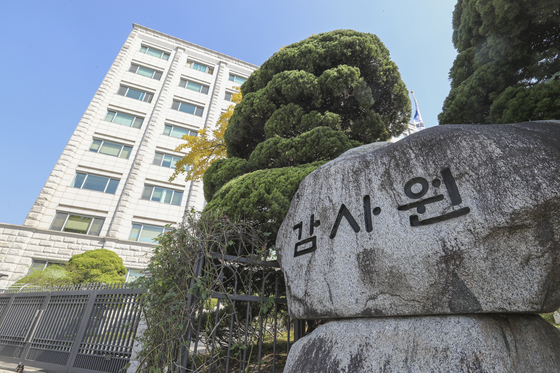
A view of the Auditorium in Jongno-gu, Seoul. Reporter Lim Hyun-dong
The Board of Audit and Inspection undertook an audit of the Moon Jae-in administration’s post-nuclear power plant policy implementation process. The Board of Audit and Inspection announced on the 14th that it has begun a written audit of the basic energy plan for the Ministry of Trade, Industry and Energy and the Ministry of Science and ICT. Written audits will be conducted until the 22nd, and a face-to-face audit will also be conducted while looking at the situation of the novel coronavirus infection (Corona 19).
This audit was due to a request for a public interest audit in June 2019, with the consent of 547 Ulsan citizens of the then Liberal Korean Party (currently People’s Power), Gap-yoon Jung. At the time, Congressman Chung requested an audit, saying, “The policy of post-nuclearization was unilaterally promoted without any legal basis only for the implementation of the presidential pledge.” The Board of Audit and Inspection had already decided in June of last year to conduct an audit on some of the cases requested by Chung and others, but it has been postponed due to the spread of Corona 19.
The auditor explained that the audit was “an audit of the procedure for establishing the basic energy plan and the basic electricity supply and demand plan.” The basic energy plan is the highest legal plan in the energy field established every five years, and a basic plan for power supply and demand is established based on this. The Moon Jae-in administration confirmed the 8th basic plan for power supply and demand according to the 2017 roadmap for nuclear power plants, and then revised the 3rd basic energy plan in June 2019. The auditor checks whether this process is legal.
The Board of Audit and Inspection emphasized, “This audit is not an audit of the post-nuclear policy.” This means that only procedural legality is considered, not the validity of the post-nuclear policy. Regarding the report that the Blue House was included in the audit target, the auditor said, “It is not true.” It is also separate from the audit of Wolseong Nuclear Power Plant Unit 1, which the auditor concluded last October that there was a problem in the process of evaluating economic feasibility. The Wolseong Unit 1 audit was conducted by the Public Institutional Inspection Bureau, but this time, it is conducted by the Audit and Rescue Bureau.
An official from the Ministry of Industry stressed, “The reason why the power supply and demand plan was established without revising the’Basic Energy Plan’ is because there are no binding forces and there are no legal problems.”
![Auditor Choi Jae-hyung attended the plenary meeting of the Legislative Judicial Council held at the National Assembly in Yeouido, Seoul on the morning of November 16 last year, closing his eyes and thinking. [뉴스1]](https://i0.wp.com/pds.joins.com/news/component/htmlphoto_mmdata/202101/14/a50f377c-d730-41bd-b959-2ffb7a511c9c.jpg?w=560&ssl=1)
Auditor Choi Jae-hyung attended the plenary meeting of the Legislative Judicial Council held at the National Assembly in Yeouido, Seoul on the morning of November 16 last year, closing his eyes and thinking. [뉴스1]
Around the opposition party, there is also a prospect that “if the auditor determines that there is a problem in the process of establishing the basic energy plan, the decision to shut down Wolseong Unit 1 will shake the legitimacy of the Moon Jae-in government’s policy to post nuclear power plants.”
Unfortunately, the ruling party launched an attack against the auditor on the 11th, when the auditor initiated an audit. Lee Nak-yeon, head of the Democratic Party, said at the party’s highest committee meeting on the 11th, “It is difficult to understand the results of the audit of the Auditor, which has been monitoring the Wolseong nuclear power plant for more than a year and has not confirmed the leak of radioactive materials,” It was a remark in connection with the controversy that tritium, a radioactive material, was detected near the Wolseong nuclear power plant. Chief spokesman Choi In-ho also said, “This time it was revealed that the auditor’s audit and the prosecution’s investigation were biased and excessive.”
However, from the beginning, the audit of Wolseong Unit 1 was only subject to the procedural issue of economic evaluation at the request of the National Assembly. In the National Assembly’s audit request, the safety issue of Wolseong Unit 1 was not subject to the audit. The suspicion of a tritium leak and the audit of the auditor had nothing to do with it, but a reaction that the ruling party suddenly attacked the auditor and questioned came from the political circles at the time. Even just before the auditor announced the results of the Wolseong Unit 1 audit last year, the ruling party made an attack such as “Resign” to the auditor Choi Jae-hyung.
Reporters Kihwan Kim and Sungmin Yoon [email protected]
